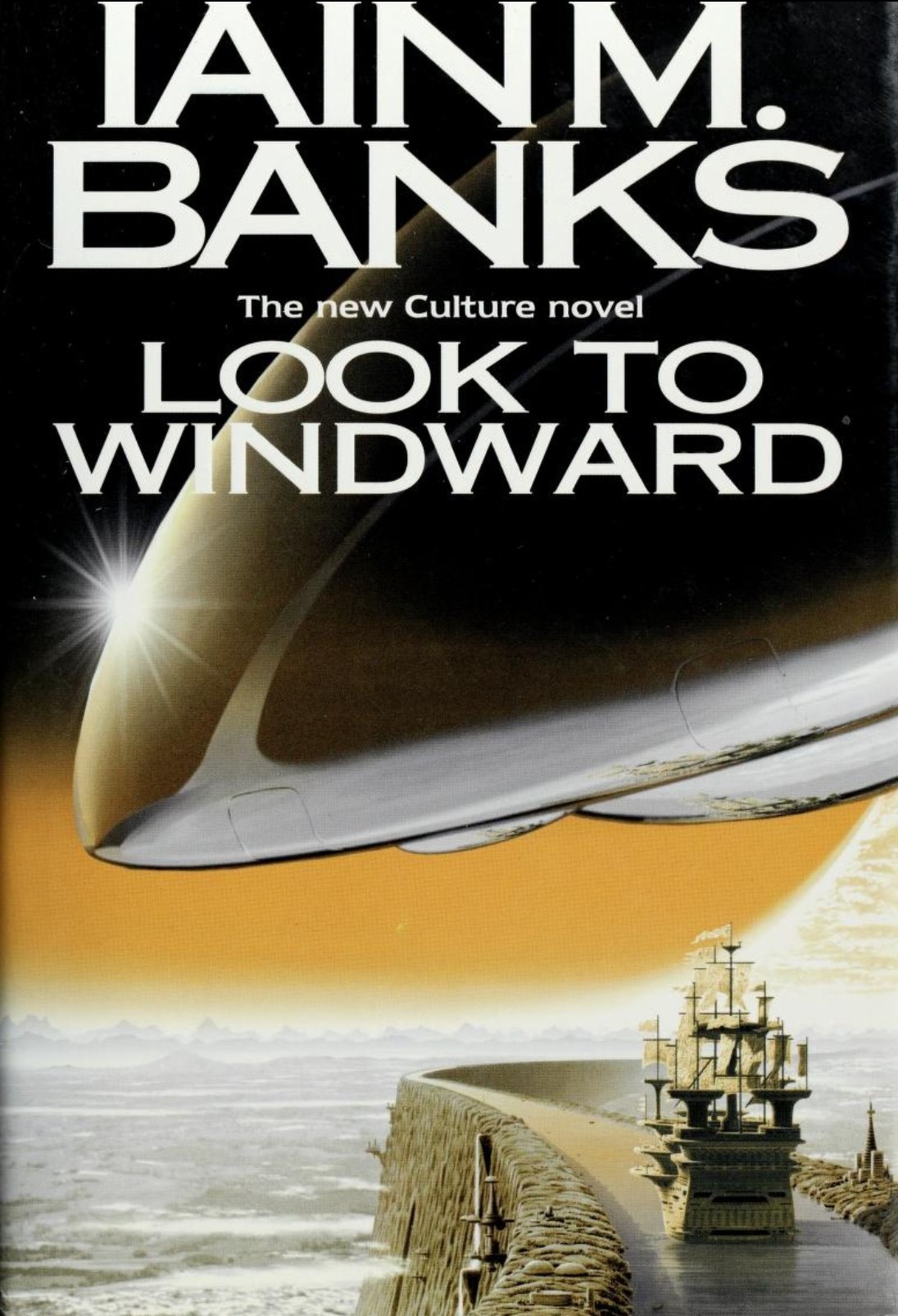Look to Windward

Review
Look to Windward, by , is the seventh book in the Culture series. It explores the aftermath of the Idiran–Culture War and Chelgrian civil war.
The story takes place on the Masaq’ Orbital as the light from the last battle of the Idiran–Culture war reaches the habitat, prompting its inhabitants to reflect on the conflict. The main characters are:
-
Mahrai Ziller, a cat-like Chelgrian composer living in self-imposed exile from his people, commissioned to write a symphony commemorating the war’s end.
-
Major Quilan, a Chelgrian operative supposedly visiting Masaq’ to persuade Ziller to return home, but actually on a mission of revenge.
-
Admiral Huyler, a preserved mind sharing Quilan’s body as a copilot.
-
Masaq’ Hub, the Culture Mind managing the Orbital, formerly a warship that committed atrocities during the war.
-
Uagen Zlepe, a Culture academic studying gigantic beings far from the Orbital who becomes entangled in Quilan’s plot.
The Chelgrians plan to destroy Masaq’ Hub and kill billions in revenge for the Chelgrian civil war, which the Culture accidentally triggered while trying to reform the Chelgrians’ brutal caste system.
Consider Phlebas
Look to Windward is a sequel to Consider Phlebas, but in many ways it feels more like a rewrite. Both books share core themes, especially the idea that individuals rarely influence larger events. In Consider Phlebas, this plays out through the death of almost every character in a mission to capture or recover a Mind that proves meaningless to the war effort. In Look to Windward, it’s shown through Zlepe’s seemingly urgent mission to warn of Quilan’s genocidal plot—a plot that was doomed from the start. In both cases, the characters’ actions have no impact on the wider galaxy.
Both books examine the Culture through their enemies’ eyes—enemies who lost wars that the Culture initiated—and explore the moral ambiguities of the Culture’s military interventions to reshape other societies.
The Waste Land
The connection between these books is reinforced by their titles: both Look to Windward and Consider Phlebas are drawn from ’s The Waste Land. Look to Windward weaves the poem’s imagery throughout: Masaq’ Hub literally “turn[s] the wheel and look[s] to windward”; Zlepe’s fate mirrors that of Phlebas, who died during a voyage and is trapped forever in a whirlpool, just as Zlepe dies in space with his body doomed to orbit the galaxy; and the eDust assassin embodies “fear in a handful of dust.”
Look to Windward shares The Waste Land’s focus on death and rebirth. These themes are hammered home1 through parallel stories: Ibm Dolince choosing to let his physical body die and upload his mind, paired with Nisil Tchasole’s rebirth into a new body. The Chelgrians back up their minds for heaven or rebirth, as we see with Admiral Huyler, while the Culture does it to preserve their citizens, which are stored in the Hub until rebirth. Quilan’s wife’s total death—with no backup for rebirth—drives his suicidal mission. The Hub itself has died twice, been restored from backup once, and transferred to its current body on Masaq’. In the end, both the Hub and Quilan choose complete erasure—true death with no chance of rebirth.
Thoughts
At the end of Look to Windward we learn that the stakes we thought were in play never were. While this might put some off, but I loved the book as a tour of a Culture Orbital, and for the deep characters: Quilan and the Hub are great portrayals of veterans suffering from PTSD.2
I particularly appreciated Zlepe’s storyline as a red herring—his desperate rush to warn the Culture of the attack, only to die in the attempt and reveal that the Culture knew all along. It is a more effective demonstration of individual insignificance than Consider Phlebas, particularly because of how it subverts the traditional “hero saves the day” narrative.
The dialogue between Ziller and the Hub about artistic creation—specifically, why Ziller should compose at all when any Culture Mind could perfectly replicate and improve upon his style—resonates strongly with current debates about AI’s role in art.
Look to Windward gives us a more personal look into how Minds operate than Excession, while still showing glimpses of the kind of Mind-vs-Mind plotting we saw there. We’ve seen the Culture’s interventions work out before—the careful scheming in The Player of Games, the covert ops in Use of Weapons, and the subtle manipulation in Inversions—but here we see what happens when their calculations fail, leading to catastrophe.
Look to Windward reminds me of several recent reads: the memory backups and artificial afterlife echo both the Commonwealth humans in Pandora’s Star and the virtual heaven in Blindsight. Masaq’ Orbital’s Great River seems to have influenced Heaven’s River. The Culture Minds’ practice of unauthorized brain scans to prevent deaths parallels the central premise of Valuable Humans in Transit.
Look to Windward is another great entry in the Culture series. I’m looking forward to seeing how Matter’s story, about another Culture intervention, compares.
-
lampshades this:
The pairing of this [Misil Tchasole’s] rebirth with Ibm Dolince’s death was supposed to take some of the sadness out of the man’s departure, but Ziller found the very neatness of the pairing trite and contrived.
-
The book is dedicated “For the Gulf War Veterans”. ↩